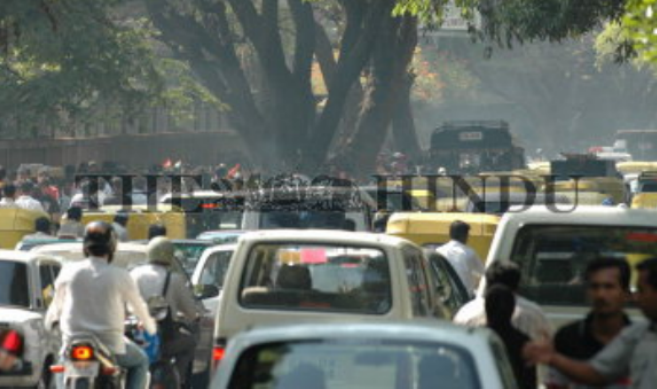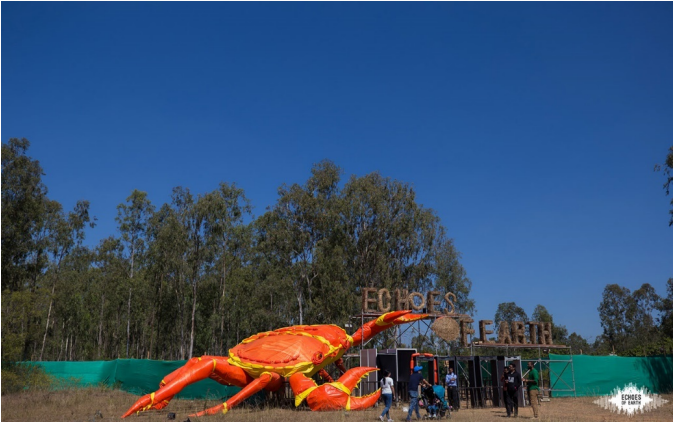Abstract
Live events are an avenue for community building through entertainment. At present, event managers are innovating to incorporate social distancing as part of live event experiences. But, another element of live events that requires urgent focus is: sustainability. This is particularly a problem in India, with live events adding to the huge waste and air quality problem in the country.
Echoes of Earth stands out among a new wave of eco-friendly events for its radical use of sustainable practices right from conceptualization to execution. While not all event managers can and/or will want to incorporate all of the sustainable practices, the value of eco-friendly events is in that they help reduce costs while also promoting green living
This Case Study is brought to you by Nelis’ 4REVS Research Program. Nelis is an NPO with an active and expanding network of young social innovators and leaders, sustainability practitioners, and creative minds from all continents (100+ countries) that enables us to provide experiential and on-the-ground knowledge. If you want to know more or be part of our network, please leave a comment! Or contact us in www.nelisglobal.org
Overall Description
Live events like music concerts, art festivals, and marathons hold tremendous social and entertainment value. While the current COVID-19 pandemic has paused a majority of such events, they have re-started in many parts of the world. Many event managers are innovating to allow people to enjoy live events while maintaining social distancing norms. Yet, there is one other aspect of live events that needs attention: sustainability.
Impact of live events on the environment
While live events are generally not seen from the lens of sustainability, they are one of the biggest hotspots for carbon footprint, in forms of:
- Plastic waste (primarily, single-use plastic) from cutlery, straws, water bottles
- Paper waste from flyers, business cards, menus, tickets stubs
- Food waste from leftover or unsold food
- Mixed waste from signages, stands, other decors
- Air pollution from people who travel to the event and stagnant traffic within and outside the event venue
- Carbon footprint from electricity usage for stages, lighting, sound & music
According to Powerful Thinking, a non-profit collaboration that supports smarter practice and innovation in energy management for the outdoor events and music industry, British festivals produced 23,000 tons of waste in 2015 alone. 68% of this waste was either incinerated (adding to air pollution) or dumped in landfills.
Asia, in comparison to the UK, has a lot more people and therefore many more such live events taking place. This is the case especially in India, where the number of live events and their attendance have grown exponentially in the last decade.
Environmental impact of live events in India
The live events market in India is valued at over 1 Billion USD, an estimate that is reinforced by the success of many live event ticketing and management companies in the country. At the same time, India generates 62 million tons of waste every year and is home to 21 out of 30 most polluted cities in the world. Live events, while bringing people and society together, are adding to this sustainability problem.
There have been many instances in of live events in India that have had a negative impact on the environment. Here are 5 such instances that have left a negative impact on the environment:
#1: This is what Justin Bieber’s fans left at the Mumbai stadium after the concert in 2017. It took the sanitation authorities multiple hours to clean up the mess in and around the venue:

#2: Bottles lie strewn around at Worli Seaface as the Mumbai
Marathon (January 2014) is in progress: (Pic: Bipin Kokate)

#3: Waste being manually sorted after a Bacardi NH7 Weekender in
Meghalaya:

#4: The 80,000-strong crowd at the Coldplay-headlined Global Citizen India Festival, left behind a trail of trash; including water bottles and food:

#5: Traffic jams around stadiums due to cricket (the most popular sport in India) matches were a problem even back in 2005:

Weddings, too, are a high-waste affair in India. This is not limited to big-budget weddings which result in discarded plastic cutlery, used flowers and a large amount of food, which mostly goes to waste.
With over a million weddings happening in India every year, weddings are a big contributor to carbon footprint of live events in India. Like weddings, many other live events do not come in focus for their sustainability due to the emotional, religious and cultural connect.
As the examples show, designing eco-friendly events in India will not happen overnight. But, what might it take for India to improve the sustainability live events and outdoor entertainment experiences? The answer to this question will define the present and future of eco-friendly events in India.
Stakeholders of eco-friendly live events in India
For live events in India to become sustainable, the eco-friendliness of live events needs to be inherent by design and not just as an alternative to unsustainable practices. The key influencers who can makes this happen are,
- Event managers and event management companies. They are the heart of designing and conducting an event. By adopting sustainable practices, they can save time and money while reducing their carbon footprint. For instance,
live events that re-use or upcycle stage construction materials are more economical than others. - Event sponsors. They provide money and resources so that the event can actually take place. Many of them are multinational corporations (MNCs) who are generally bound by CSR. By choosing to sponsor events that are eco-friendly can add to their CSR marketing while also encouraging more events to become sustainable.
- Local government. In India, the local government acts as a legal approver for events to take place, ensuring safety by deploying police and fire engines for the duration of the event. Adding greener waste management and electricity
related requirements for approval will hold event managers and companies accountable for their events’ sustainability. - Public. They are the primary consumers of live events. By showing a clear preference for eco-friendly events and also by becoming more responsible with their behavior at live events, the public can single-handedly have the biggest possible impact on the sustainability of events in India.
The four stakeholders of live events in India are equally important in paving the path for India to improve the sustainability live events and outdoor entertainment experiences.
While India is a nascent market for eco-friendly live events as compared to Europe, progress is being continually made, as a result of higher awareness as well as evolving preferences.
Echoes of Earth: India’s greenest music festival
As the United Nations (UN) is pitching for greening the entertainment industry, the annual, two-day long Echoes of Earth stands out as an example of how radically eco-friendly live events could be. Every element of Echoes is designed and curated keeping sustainability at its core.
- Design. 80% of the festival production – stages, art installations and generic festival build is made up of recycled, up-cycled, re-purposed and junked media.
- Waste Management. The event’s waste management partners ensure an always-clean venue along with efficient waste segregation. Post the event, the segregated waste is sent to recycling centers in the city. Overall, it is a zerowaste event by design.
- Raising awareness on green living. Workshops and activities that educate attendees on incorporating green practices in their everyday life find place in the event’s agenda.
- Plastic/flex free. Apart from effective waste management, Echoes of Earth uses biodegradable materials for décor and also encourages attendees to bring their own water bottles.
- Stage powered by clean energy. The main stages of the event are fully powered by solar energy. There are also charging stations which are powered by solar. The event is aiming to eventually be fully powered using solar energy.
While zero-waste event, Echoes of Earth, is an example of an extremely eco-friendly design, it fits the goal of the event – which is to bring together a sense of community through India’s musical heritage and environmental sustainability.
Not all live events will share similar goals. This does not mean that sustainable practices can be put in place to save money and also improve sustainability. If live events do not become more ecofriendly, we are looking at a future where artists like Coldplay will stop touring due to environmental concerns and negative association with sustainability – and that is opposite of entertainment.
Main features or highliths
Live events and environmental sustainability
- Live events are one of the biggest hotspots of carbon footprint, as it contributes to waste and air pollution.
- British festivals produced 23,000 tons of waste in 2015 alone
Impact of live events in India
- India’s live event attendance has grown by over 100% in 2019
- Live events are a quantitatively small, but culturally big contributor to the 62 million tons of waste that India already generates every year
- Live events also contribute to poor air quality in India, a country which is home to 21 out of 30 most polluted cities in the world
- Unsustainable live events are a problem in India from the early 2000s, but is a problem that has not been solved at scale
Influencers of greening live events in India
- The key stakeholders for developing accountability around live events in India are:
- event managers and event management companies
- major event sponsors
- local government authorities
- attendees of live events (public)
- The extent of live events in India are fewer as compared to regions like Europe, but a lot of progress has been made in the last 3 years due to higher awareness and shift in public preferences
Echoes of Earth: India’s greenest music festival
- Echoes of Earth is an example of how eco-friendly a live event can be through:
- sustainable design
- effective waste segregation, management and recycling: a zero-waste event
- workshops and activities that promote green living
- plastic and flex free zone
- solar powered stage and charging stations
- Practices for sustainable live events can be applied to conventional live events as well
- Sustainable live events are a better alternative to a future where artists like Coldplay stop touring due to environmental concerns
Why is this Revolutionary?
While eco-friendly alternatives to everyday actions do have the greatest environmental impact, the resources that are spent at relatively rare occasions are significant. One example of such a rare occasion is attending a live event.
Eco-friendly live events are also economic.
While eco-friendly live events will directly contribute to reduced waste and air pollution, the economics of doing so will help more event managers adopt this strategy. Due to increased re-use, upcycling and recycling of resources, along with norms of ecofriendly alternatives, event managers save costs while creating a
sustainable live event experience.
Eco-friendly events encourage green living.
Entertainment is an effective avenue to influence human behavior.
From movies and music to other popular culture, entertainment has been modifying people’s preferences. Examples include Netflix which has led to fewer people visiting the cinemas, Tesla which has made an electric car that is in the league of the best automobiles in the world. Similarly, this is an opportunity for eco-friendly live events to be the norm, rather than a “good to have” alternative.
Concrete Examples
While there is a steadily growing number of eco-friendly live events in Asia, one stands out.
Echoes of Earth
Positioned as India’s greenest music festival, Echoes of Earth lives up to its promise as a radically eco-friendly live event. It is a joint venture of Swordfish Events & Entertainment and Watson’s. The first edition of the event was in 2016.
Based in Bangalore, India, Echoes of Earth aims to brings together a community to celebrate a love for music, India’s music heritage, and environmental sustainability.
Swordfish Events & Entertainment is an innovation agency in the event and marketing space headquartered in Bangalore, India with a Global footprint. Swordish is founded and managed by Roshan Netalkar.
Watson’s is Bangalore’s popular neighborhood pub, known for its culture of bonhomie, good times and passion for music. It is a brand of a chain of grub pubs owned by Bangalore-based, Shilton Hospitality. Watson’s was started by five business partners – Sameer Chib, Shyamsundar Chawla, Jitesh Kanani, Amit Roy, and Anil Nagpal.
Visit Echoes of Earth website gallery, Facebook and Instagram for more visuals from the music festival.
Visuals (incl. references)



Links and resources
- Chow, Rylee. “Dancing Green: 10 Events in Asia That Are
Setting the Stage for Sustainability.” Mixmag Asia, 2020,
www.mixmag.asia/feature/dancing-green-10-events-in-asiathat-are-setting-the-stage-for-sustainability - Hardie, Clemi. “What Are the Most Common Areas of Waste
At Live Events?” Noodle Live, 23 Mar. 2020,
www.noodlelive.com/blog/what-are-the-most-commonareas-of-waste-at-live-events/ - Kaushik, Divya. “Make Your Wedding a Low-Waste Affair –
Times of India.” The Times of India, The Times of India, 10
Jan. 2020, www.timesofindia.indiatimes.com/lifestyle/spotlight/make-your-wedding-a-low-wasteaffair/articleshow/73187619.cms - Raja, Vidya. “Functions, Events Generating Mountains of
Trash? This Start-Up Will Help Stop That.” The Better India,
22 May 2019, www.thebetterindia.com/183009/mumbaiwaste-event-planning-sustainable-landfill-skrapsegregation/ - Shekhar, Divya. “Bengaluru’s Cultural Events Pitch in for
Sustainability, Artists Become Eco-Friendly.” The Economic
Times, Economic Times, 15 Oct. 2018,
www.conomictimes.indiatimes.com/magazines/panache/bengalurus-cultural-events-pitch-in-for-sustainability-artistsbecome-eco-friendly/articleshow/66211014.cms - “The Show Must Go On Report.” Powerful Thinking, 27 Apr.
2018, www.powerful-thinking.org.uk/resources/the-showmust-go-on-report/ - UN Environment. “Greening the Entertainment Industry Is
Music to Our Ears.” UN Environment, 2020,
www.unenvironment.org/news-and-stories/story/greeningentertainment-industry-music-our-ears
Article by: Aravind Kannan, 4REVS researcher (and more)


